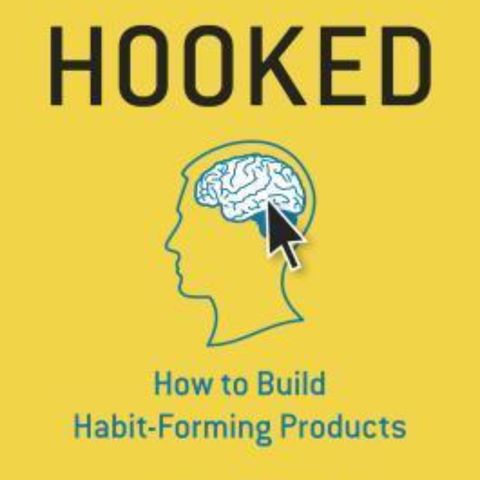Hooked: The Science of Building Habit-Forming Products

Download and listen anywhere
Download your favorite episodes and enjoy them, wherever you are! Sign up or log in now to access offline listening.
Description
Chapter 1: Summary of Hooked "Hooked: How to Build Habit-Forming Products" by Nir Eyal, with contributions from Ryan Hoover, is a guide for product designers and entrepreneurs looking to create...
show more"Hooked: How to Build Habit-Forming Products" by Nir Eyal, with contributions from Ryan Hoover, is a guide for product designers and entrepreneurs looking to create engaging and addictive products. The book presents the "Hook Model," a framework that describes the process through which products encourage user engagement and habit formation.
Here’s a brief summary of the key concepts:
- The Hook Model: The framework consists of four main components:- Trigger: External triggers (like app notifications) and internal triggers (emotional responses) prompt users to engage with a product.- Action: This is the behavior the user takes in anticipation of a reward, facilitated by a motivation, ability, and prompt.- Variable Reward: Users receive rewards, which can vary in magnitude and type, encouraging continued engagement and creating anticipation.- Investment: Users invest time, effort, or resources into the product, increasing the likelihood of returning due to a sense of ownership and commitment.
- User Behavior: Eyal discusses the psychology behind how habits are formed and emphasizes the importance of understanding user needs and motivations.
- Practical Applications: The book offers insights into how to apply the Hook Model to create products that satisfy user needs and foster habits without manipulation. It stresses ethical considerations in designing habit-forming products.
- Case Studies: Eyal provides real-world examples of successful companies that have utilized the Hook Model, illustrating how these principles are applied in various industries.
Overall, "Hooked" serves as both a theoretical framework and practical guide for creating products that resonate with users, driving engagement and fostering lasting habits in a responsible manner.
Chapter 2: The Core Themes of Hooked
"Hooked: How to Build Habit-Forming Products" by Nir Eyal, with contributions from Ryan Hoover, explores the psychology behind user engagement and habit formation in product design. At its core, the book introduces the Hook Model, a cyclical framework that emphasizes the importance of creating products that can drive user behavior through triggers, actions, rewards, and investment.
One of the central themes is the concept of user engagement and how successful products tap into emotional and psychological triggers to create habits. Eyal discusses both external triggers (like notifications and advertisements) and internal triggers (such as emotions and routines) that prompt users to engage with a product.
Another significant theme is the idea of variable rewards. Eyal explains how unpredictable rewards can enhance user engagement by providing excitement and motivation for users to return to a product. This ties closely to the psychological principle of intermittent reinforcement, which can foster habitual use.
The theme of investment is also crucial. Eyal stresses that when users invest time, effort, or resources into a product, they’re more likely to return, creating a deeper connection and establishing a habit. This investment can take many forms, from inputting personal data to creating content.
Finally, "Hooked" raises ethical considerations about habit-forming products. Eyal encourages product designers to be mindful of their responsibility to create positive habits that improve users' lives, rather than manipulative practices that exploit users.
Overall, "Hooked" serves as a guide for understanding the mechanics of habit formation and offers insights into how to ethically design products that resonate deeply with users.
Chapter 3: 10 Quotes From Hooked
"Hooked: How to Build Habit-Forming Products" by Nir Eyal (with insights from Ryan Hoover) offers valuable insights into product design and user behavior. Here are ten notable quotes from the book:
- "To create a habit-forming product, you need to understand the psychology of users."
- "Users don’t just want to solve a problem; they want to feel fulfilled."
- "The Hook Model consists of four stages: Trigger, Action, Variable Reward, and Investment."
- "Every action you take is prompted by a trigger."
- "Rewards are the key to creating habits; they must be engaging and variable."
- "Investment increases the likelihood of returning users."
- "Success is not just about building a better product; it’s about creating a habit."
- "Habits are formed by a loop of repetitive actions driven by triggers."
- "User engagement grows when they have invested in the product."
- "The most successful products are those that become a part of daily routines."These insights encapsulate the core principles of habit formation and how to apply them in product development.
Book https://www.bookey.app/book/hooked-by-nir-eyal%2C-ryan-hoover
Youtube https://www.youtube.com/watch?v=Fvde0h-fndM
Amazon https://www.amazon.sg/Hooked-How-Build-Habit-Forming-Products/dp/1591847788/ref=sr_1_1?adgrpid=101434240051&dib=eyJ2IjoiMSJ9.aKspLlPTxQmzMfa9S-Cq5RtcZpeJ5WFexgoRsYw_XUrLZYxDn8exVQYhiUay9PXhRMD29XJUgskY4Y2eebnFTHX00jHyG7SX-J7gQMVlB2s6FbFFqxwh8dJBjdAqVZQrxGF5BiaXr7fwtmqFVzgrFVHXxl-3goUWwe78PBIMrdon_1KXqlgOlsBEzLj__pO6e68068AupuX979hUFnZ1K2qlgr8pGTfkxFV-vcj3PPMo-g95nCfmags4vzcWKoekm6DZ-wq7-Gfkyg5Pbqsl4UFQhlF4LyJyrHpBafMPDHY.4H7qtK6BQoFFG6drxZ65xd-Uuio7LP2e5TTN4m3rLtM&dib_tag=se&hvadid=419788633126&hvdev=c&hvlocphy=9062500&hvnetw=g&hvqmt=e&hvrand=10782175846546023788&hvtargid=kwd-100780389&hydadcr=4516_51958&keywords=hooked&qid=1731635421&sr=8-1
Goodreads https://www.goodreads.com/book/show/22668729-hooked?from_search=true&from_srp=true&qid=Y14uY5kbGG&rank=2
Information
| Author | Bookey |
| Organization | pancheng li |
| Website | - |
| Tags |
Copyright 2024 - Spreaker Inc. an iHeartMedia Company

Comments